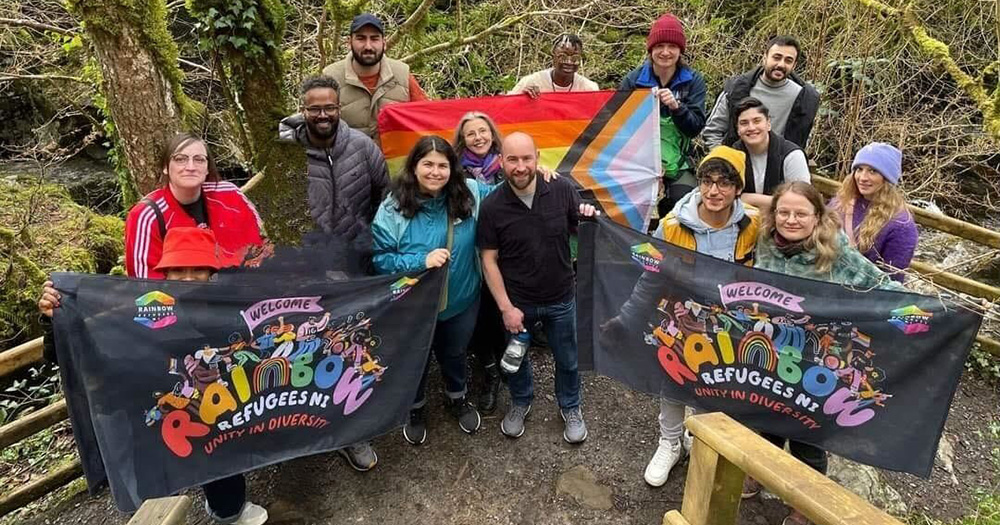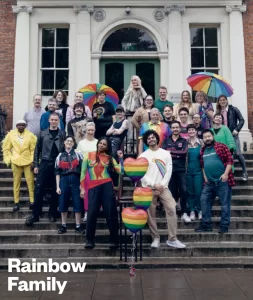In 2022, Rainbow Refugees NI led the Belfast Pride Parade with the powerful message ‘Refugees Welcome’, proudly challenging a rising homophobic and racist anti-immigration rhetoric across Ireland and England. In conversation with Oisín Kenny, researcher and learning officer Chougher Maria Doughramajian speaks of the joy in hearing her first language in queer spaces, the increasing need for LGBTQ+-specific refugee housing, and the ongoing fight to end systemic harm against those seeking asylum.
Many queer people across the globe are forced to flee their homes for fear of life-threatening persecution, discrimination, and violence. In hopes of finding safety and refuge, they can be subjected to a tumultuous, dehumanising asylum process and ever-growing vile racist and homophobic anti-immigration rhetoric within the host country. Thankfully, organisations like Rainbow Refugees NI are here to help.
Across the globe, currently 65 jurisdictions criminalise same-sex relations, according to the Human Dignity Trust. 12 countries uphold the death penalty for same-sex relations and 14 countries criminalise the lives of trans and/or non-binary people. The prevailing threat of persecution cuts access to vital support networks, including families, friends, and communities. Oftentimes, some of these aforementioned networks actually pose the greatest threat to queer lives and their wellbeing.
The treatment of LGBTQ+ people seeking asylum often fails the standards set by national and international laws, as noted in the Department of Children, Equality, Disability, Integration and Youth and LGBT Ireland’s report LGBTI+ People Living in International Protection Accommodation Services (IPAS) accommodation: Best Practices and Lived Experiences.
It reads, “LGBTI+ asylum seekers are at a heightened risk of experiencing increased isolation, discrimination, and victimisation in the host country”.
View this post on Instagram
Addressing the asylum system’s impact on queer people’s mental health and wellbeing, Chougher Maria Doughramajian commented on “the amount of suicide ideation and attempts caused by their own traumas of fleeing but also arriving to uncertainty and to hostility as well. We do have a mental health service crisis in the North. There’s just not enough resources for anyone really but more so for LGBTQ+ refugees.”
Entering into the asylum system can be intensely traumatising for queer people, isolated from their community, uncertain about who to trust, and reliving past experiences of discrimination. A lack of queer-specific support further aggravates this stressful process.
Chougher addressed one such barrier, “There is a big mistrust between the LGBTQ+ community who don’t speak English, and interpreters, because a lot of interpreters come from their own smaller communities. And they might see them at the church or the mosque, etc. And there have been noted cases of outings or cases of misinterpretation.”
LGBTQ+ people seeking refuge, alongside community groups and various organisations across Ireland and England are calling for a more sensitive, considered, and queer-led approach to the asylum process as a way of tackling wider homophobic and racist attitudes. These calls are also directed towards the credibility assessment process of those requesting asylum, on the grounds of protection against persecution for their sexuality and/or gender identity. This process might include invasive questions about sexual history and reliving past experiences of abuse and discrimination.
In the earlier mentioned IPAS report, it states, “Not only is disclosing one’s gender or sexuality often a complex and emotionally painful experience in and of itself, but the lack of appropriate support before, during and after such disclosure increases the risk of disclosure being detrimental for the person’s mental health.”
Further speaking on the assessment experience, Chougher said, “You come to a place where they want physical or material proof of your queerness, which is a bizarre concept, because how can you prove your sexual orientation? It’s quite dehumanising, the interviews. (…) Of course, we have members that get rejected on the first instance. And then there’s another thing of being there for them until they go through the appeal process. (…) It’s quite a terrifying and daunting process.”
While enduring a relentless asylum process, many queer people must share unsafe accommodation alongside individuals who express the national or religious attitudes of the countries which persecute based on sexuality and/or gender identity. Chougher addressed the ways in which Rainbow Refugee NI are actively “advocating on the stories and the cases of our members to serve as a call to action to prevent these things from happening.
“Because yes, these companies and organisations are reacting once a hate crime takes place. But we want to prevent these from happening in the first place, because we know, if dedicated LGBTQ+ housing is done, that would really solve a huge problem that most of our members face. And it really affects their physical wellbeing, their mental wellbeing, it’s a huge, huge risk, because they’re just not safe. Even though they’re technically coming to seek asylum and seek safety, they’re still not safe within their own accommodation.”
In 2022, a group of queer people living in Belfast came together and formed Rainbow Refugees, advocating for the wellbeing of those seeking asylum and openly challenging rising anti-immigration rhetoric. During that same year, they led Belfast Pride Parade under the banner ‘Refugees Welcome’. Many of those marching on the day wore masks painted with the flags of countries where their lives continue to be criminalised.
As highlighted by countless lived experiences and various reports, a support group such as Rainbow Refugees NI can be a vital lifeline for those seeking refuge. It presents a space to find, make, and celebrate communities. Speaking about the significance of this social element, Chougher shared, “I’m an LGBTQ+ person of refugee background myself. I’m originally from Syria, and I remember it was the Christmas themed (social gathering). That was the first one I went to.
“I just remember the first thing was, ‘Oh, my God, like, all these people are LGBTQ+ people’. And then for me, I could hear the Arabic. It’s just stunning. Especially in a place like Ireland, especially in the North. These LGBTQ+ spaces aren’t necessarily at that point yet, where you see a lot of people of colour, let alone people from your own country, like it’s still quite white, it’s still quite Northern Irish, so there’s not really that space yet.
“I was just stunned to meet people from my own country, dance and talk about gay things. And it’s just that you don’t have any reservations. You’re not thinking twice, it was just a very comfortable space.”
View this post on Instagram
Since Belfast Pride 2022, Rainbow Refugees NI has met monthly, with membership growing to more than 50 people, representing around 20 nationalities. Chougher spoke on the way in which the group’s open and comfortable environment contributed to its growth: “Even when you’re moving in queer spaces, it’s still closed off a bit, there’s still racism, there’s still bits and pieces that the community as a whole should be working on. Despite (Rainbow Refugees NI) being completely voluntary led, the need is there, and we’re growing by the day.”
This growth has been felt across the board for Rainbow Refugees NI, including visibility, reach, and support for their work. By engaging in conversations with Mears Group, which provides accommodation for those seeking asylum in Northern Ireland, the team now has posters up in those spaces, raising awareness about what they do.
Rainbow Refugees NI provides its members with a safe and supportive environment in the face of an increasingly hostile political and social environment. In May 2024, the High Court in Belfast ruled that certain provisions of England’s Illegal Migration Act 2023, including the ability to divert those seeking asylum to a ‘safe’ country such as Rwanda, should not apply to Northern Ireland.
These new measures presented a real and concerning threat for many queer people fleeing persecution from their home country.
Speaking on the way in which these provisions affected their members, Chougher said, “So effectively, up until appeals and other things kick in, nobody can be deported from Northern Ireland to Rwanda, which was a huge relief. Because, our last meetup, that was the only thing we talked about, even though it was sexual health that we were meant to talk about, but we were like – we can’t just talk about sexual health when there are people in the room that are at the risk of being deported to Rwanda of all places.”
Rainbow Refugees NI hosts a range of different activities for its members, supported by an ever-developing network of ally organisations and groups. In terms of supporting their work, Chougher said, “For the monthly meetups, we really rely on other service experts – like the Céilí, we relied on the South Belfast Irish Dancing Academy to come in and volunteer their time to show us their moves and jigs. And same with sexual health, it was folks from the Rainbow Project. So we’re always open to people that are open to come and share their expertise.
“It is a closed group, because we need to protect the identities and the privacy and the safety of our members. But we are always welcome for ally organisations, it doesn’t always have to be an LGBTQ+ organisation as such, but people who are allies and experts that want to come in and facilitate something for our members,” Chougher concluded.
Rainbow Refugees NI is a powerful reminder that no one should have to face the inhumane asylum process alone. Everyone has the right to feel safe in themselves, their community, and their home. Organisations, individuals, and the wider host country must uphold this and end the systems which persecute those seeking safety.
If you are an LGBTQ+ person seeking support during the asylum process, these organisations and groups are here to help:
Rainbow Refugees NI
Instagram: @rainbowrefugeesni
Facebook: RainbowRefugeesNI
Rainbow Project
Phone: 028 9031 9030
Email: [email protected]
LGBT Ireland
Phone: 1800 929 539
Email: [email protected]
Outhouse
Phone number: (01) 873 4999
Email: [email protected]
Irish Refugee Council
Email: [email protected]
Belong To
Phone: (01) 670 6223
(Monday-Friday 9am-1pm / 2pm-5pm)
This story originally appeared in Issue 384 of GCN Magazine. Read it in full, here.
© 2024 GCN (Gay Community News). All rights reserved.
This article was published in the print edition Issue No. 384 (June 1, 2024). Click here to read it now.
Support GCN
GCN is a free, vital resource for Ireland’s LGBTQ+ community since 1988.
GCN is a trading name of National LGBT Federation CLG, a registered charity - Charity Number: 20034580.
GCN relies on the generous support of the community and allies to sustain the crucial work that we do. Producing GCN is costly, and, in an industry which has been hugely impacted by rising costs, we need your support to help sustain and grow this vital resource.
Supporting GCN for as little as €1.99 per month will help us continue our work as Ireland’s free, independent LGBTQ+ media.

